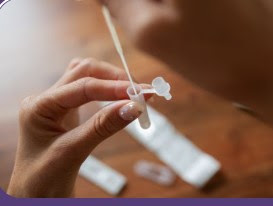The Human Papillomavirus (HPV) test is an essential screening tool that helps detect the presence of HPV, a common sexually transmitted infection (STI) that can lead to cervical cancer and other health issues. HPV is one of the most widespread infections worldwide, with certain high-risk strains linked to cervical, vaginal, anal, and throat cancers.
This article will provide comprehensive information on HPV testing, including its purpose, procedure, accuracy, and when you should get tested.
What is an HPV Test?
An HPV test is a medical screening used to detect high-risk strains of HPV that are associated with cervical cancer. It is commonly performed on women as part of routine cervical cancer screening. The test involves collecting a sample of cervical cells, which are then analyzed for the presence of high-risk HPV DNA.
Why is HPV Testing Important?
Early detection of cervical cancer risk – High-risk HPV strains can cause abnormal cell changes in the cervix, which may develop into cervical cancer if left untreated.
Prevention through monitoring – Identifying HPV infections early allows doctors to monitor and treat abnormal cervical changes before they progress.
Guiding further testing – A positive HPV test may prompt additional tests, such as a Pap smear or colposcopy, to check for precancerous cells.
Reducing transmission – Although there is no cure for HPV, knowing your status can help reduce the risk of spreading the virus to sexual partners.
Who Should Get an HPV Test?
The HPV test is primarily recommended for:
Women aged 30 and above – It is often done in combination with a Pap smear as part of routine cervical cancer screening.
Women with abnormal Pap smear results – If a Pap smear shows abnormal cells, an HPV test may be conducted to check for high-risk HPV strains.
Those with increased risk factors – Women with weakened immune systems, multiple sexual partners, or a history of STIs may need more frequent screening.
It is important to note that HPV testing is not typically recommended for women under 30, as HPV infections in younger individuals often clear on their own without causing health issues.
How is an HPV Test Done?
The HPV test is quick, simple, and painless. It is usually performed in a doctor’s office or clinic. Here’s what to expect:
Preparation: You may be asked to avoid sexual intercourse, vaginal creams, or douching for 24 to 48 hours before the test to ensure accurate results.
Sample Collection: During the procedure, you will lie on an examination table while the doctor inserts a speculum into the vagina to gently open it.
Cell Collection: A small brush or swab is used to collect a sample of cells from the cervix.
Laboratory Analysis: The sample is sent to a lab to check for high-risk HPV strains.
Results: You will receive your results within a few days to a week.
Understanding HPV Test Results
Negative HPV Test: No high-risk HPV strains were detected. This means you are at low risk for cervical cancer.
Positive HPV Test: High-risk HPV strains were found. This does not mean you have cancer, but your doctor may recommend further testing, such as a Pap smear or colposcopy, to examine cervical cell changes.
If HPV is detected, your doctor will guide you on the next steps, which may include follow-up tests or treatment for any abnormal cell changes.
HPV Test vs. Pap Smear: What’s the Difference?
Many people confuse the HPV test with a Pap smear, but they serve different purposes:
Feature | HPV Test | Pap Smear |
Purpose | Detects high-risk HPV strains | Detects abnormal cervical cell changes |
Age Group | Recommended for women 30+ | Recommended for women 21+ |
Sample Collection | Cervical cell sample | Cervical cell sample |
Frequency | Every 5 years if combined with a Pap smear | Every 3 years for women aged 21-29 |
In some cases, co-testing (both HPV test and Pap smear) is recommended for more comprehensive cervical cancer screening.
How Often Should You Get an HPV Test?
Women aged 30-65: HPV testing every 5 years (or every 3 years with a Pap smear).
Women under 30: Not recommended unless Pap smear results are abnormal.
Women over 65: Screening may stop if past tests have been normal.
Can Men Get an HPV Test?
Currently, there is no routine HPV test for men. However, men can still contract and transmit HPV. In some cases, doctors may perform anal HPV tests for men at higher risk, such as those with weakened immune systems or those who engage in anal sex.
How to Prevent HPV Infections
While HPV infections are common, there are steps to reduce your risk:
Get the HPV vaccine – The HPV vaccine (such as Gardasil 9) protects against high-risk HPV strains linked to cancer. It is recommended for both men and women between ages 9-26 and sometimes up to age 45.
Practice safe sex – Using condoms or dental dams during sexual activity can reduce HPV transmission, though it does not eliminate the risk completely.
Regular screenings – Routine Pap smears and HPV tests help detect HPV-related changes early.
Maintain a healthy immune system – A strong immune system can help clear HPV infections naturally.
When to See a Doctor
You should consult a doctor if:
You have abnormal Pap smear results.
You receive a positive HPV test.
You experience unusual vaginal bleeding, pain during sex, or persistent genital warts.
You are concerned about HPV vaccination or testing.
Conclusion
The HPV test is an essential screening tool for detecting high-risk HPV strains that can lead to cervical cancer. Routine testing, along with Pap smears, plays a crucial role in early detection and prevention. If you are 30 or older, or have abnormal Pap results, talk to your doctor about getting tested. Additionally, practicing safe sex and getting the HPV vaccine can significantly reduce your risk of infection and related complications.


